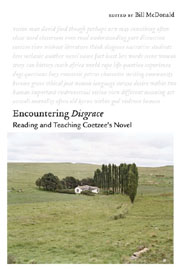Book contents
- Frontmatter
- Contents
- Acknowledgments
- Introduction
- I Reading Disgrace
- II Reading Disgrace with Others
- 11 Community Reading: Teaching Disgrace in an Alternative College Classroom
- 12 Out of the Father's House into a Community of Readers
- 13 Sympathy for the Devil: On the Perversity of Teaching Disgrace
- 14 Teaching Disgrace in the Large Lecture Classroom
- 15 Discussing Disgrace in a Critical Theory Class
- 16 Disgrace in the Classroom: A Tale of Two Teaching Strategies
- 17 The Bodies of Others: A Meditation on the Environs of Reading J. M. Coetzee's Disgrace and Caryl Phillips's The Nature of Blood
- 18 Disgrace as a Teacher
- Works Cited
- Notes on the Contributors
- Index
13 - Sympathy for the Devil: On the Perversity of Teaching Disgrace
from II - Reading Disgrace with Others
Published online by Cambridge University Press: 12 September 2012
- Frontmatter
- Contents
- Acknowledgments
- Introduction
- I Reading Disgrace
- II Reading Disgrace with Others
- 11 Community Reading: Teaching Disgrace in an Alternative College Classroom
- 12 Out of the Father's House into a Community of Readers
- 13 Sympathy for the Devil: On the Perversity of Teaching Disgrace
- 14 Teaching Disgrace in the Large Lecture Classroom
- 15 Discussing Disgrace in a Critical Theory Class
- 16 Disgrace in the Classroom: A Tale of Two Teaching Strategies
- 17 The Bodies of Others: A Meditation on the Environs of Reading J. M. Coetzee's Disgrace and Caryl Phillips's The Nature of Blood
- 18 Disgrace as a Teacher
- Works Cited
- Notes on the Contributors
- Index
Summary
On my saying, What have I to do with the sacredness of traditions, if I live wholly from within? my friend suggested, — “But these impulses may be from below, not from above.” And I replied, “They do not seem to me to be such; but if I am the Devil's child, I will then live from the Devil.”
—Emerson, “Self-Reliance”Teaching J. M. Coetzee's novel Disgrace has revealed new complexities in the book and in my teaching, and not just because my students' reactions were different from what I expected. When I'm teaching fiction I usually ask students to reflect on the sympathy they feel with the protagonist of the narrative, and how that sympathy is established. But this novel exposes the tenuous dangers of sympathetic reading, challenging readers to examine our judgments in the light of eloquent expression.
These were fifteen willing students from various disciplines, taking an introductory literature course to fulfill a general education requirement at the University of Redlands. Though I had warned them about the violence in the novel, they weren't really disturbed by that. In fact, they were very willing to confront the difficult sexual and racial questions raised by the narrative. But they were outraged at the protagonist David Lurie for his transgressions. The more strongly I defended David's reflections on his own failings, the more determined were my students to find him guilty, and so the opposition between their reading and mine, quite a natural occurrence in teaching, became more pronounced.
- Type
- Chapter
- Information
- Encountering 'Disgrace'Reading and Teaching Coetzee's Novel, pp. 264 - 275Publisher: Boydell & BrewerPrint publication year: 2009

